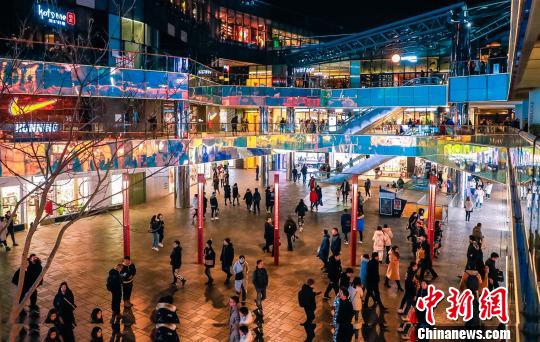


(Photo provided by Beijing Municipal Commerce Bureau )
Cities in China have taken measures to develop nighttime economy, building a diversified late-night consumption market that covers industries such as catering, tourism and entertainment.
Beijing decided to start with some well-known business districts in the city, such as Huaxi Live Wukesong and Sanlitun. It plans to set up a set of well-managed and distinctive nighttime landmarks, business districts and living areas by the end of 2021.
Shanghai issued an official document promoting the nighttime economy in April, including 24-hour movie theaters. Grand Theater and Cathay Theater became the first two theaters that open after midnight in July.
Some cities combine the nighttime economy with local sites. Nanjing in east China’s Jiangsu province held activities at night to attract tourists to the Confucius Temple and Qinhuai scenic areas.
Developing nighttime economy will stimulate consumption and bring new job opportunities, said Lai Youwei, head of Meituan Research Institute, Meituan-Dianping, China’s leading provider of on-demand services.
Data from Meituan show that in 2018, the business volume of nighttime catering increased by 47 percent compared with the previous year, 2 percentage points higher than that in the daytime.
Consumers who book tickets on the platform to visit the theme parks at night doubled this summer and the page views of related products rose by nearly 40 percent.
Han Yuanjun, a scholar with China Tourism Academy, said that the nighttime economy continues to develop because consumers grow fond of late-night pastimes, especially in summer. Meanwhile, stores and restaurants hope to increase their revenues by doing business at night.
To facilitate the nighttime economy, the government needs to improve the relevant infrastructure and services such as public transportation. Beijing extended operations of the subway Line 1 and Line 2 after midnight on Fridays and Saturdays starting from July 19. The new timetable will run from May to October.
 Fire brigade in Shanghai holds group wedding
Fire brigade in Shanghai holds group wedding Tourists enjoy ice sculptures in Datan Town, north China
Tourists enjoy ice sculptures in Datan Town, north China Sunset scenery of Dayan Pagoda in Xi'an
Sunset scenery of Dayan Pagoda in Xi'an Tourists have fun at scenic spot in Nanlong Town, NW China
Tourists have fun at scenic spot in Nanlong Town, NW China Harbin attracts tourists by making best use of ice in winter
Harbin attracts tourists by making best use of ice in winter In pics: FIS Alpine Ski Women's World Cup Slalom
In pics: FIS Alpine Ski Women's World Cup Slalom Black-necked cranes rest at reservoir in Lhunzhub County, Lhasa
Black-necked cranes rest at reservoir in Lhunzhub County, Lhasa China's FAST telescope will be available to foreign scientists in April
China's FAST telescope will be available to foreign scientists in April "She power" plays indispensable role in poverty alleviation
"She power" plays indispensable role in poverty alleviation Top 10 world news events of People's Daily in 2020
Top 10 world news events of People's Daily in 2020 Top 10 China news events of People's Daily in 2020
Top 10 China news events of People's Daily in 2020 Top 10 media buzzwords of 2020
Top 10 media buzzwords of 2020 Year-ender:10 major tourism stories of 2020
Year-ender:10 major tourism stories of 2020 No interference in Venezuelan issues
No interference in Venezuelan issues
 Biz prepares for trade spat
Biz prepares for trade spat
 Broadcasting Continent
Broadcasting Continent Australia wins Chinese CEOs as US loses
Australia wins Chinese CEOs as US loses